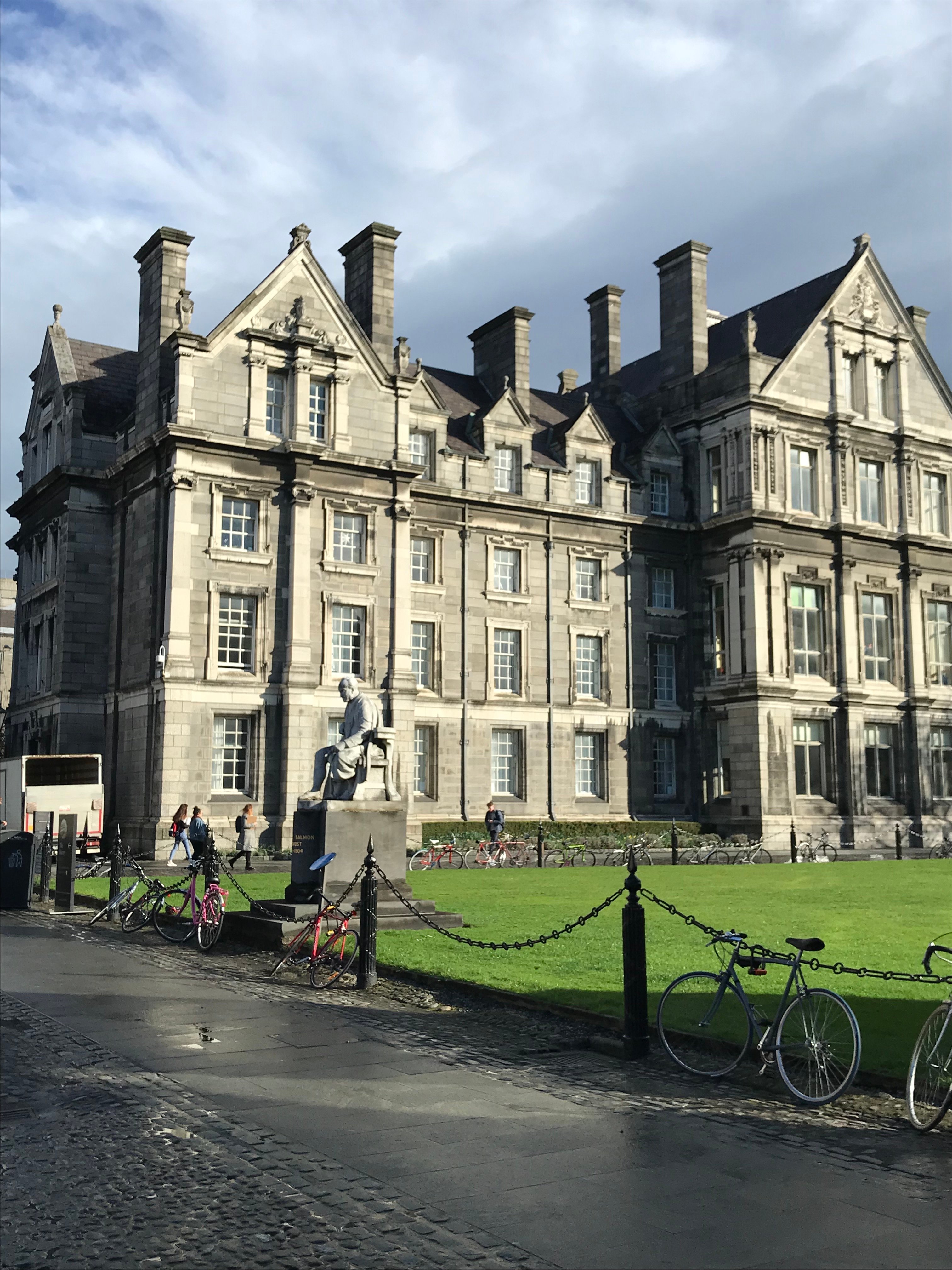“One must travel to learn.”
Mark Twain
 Last spring, Lauren Boucher and I set out from Boston to learn about colleges and universities in England, Scotland and Ireland. In Ireland, we saw Trinity College Dublin and University College Dublin. Then went to the University of St. Andrew’s and University of Edinburgh in Scotland. The last leg of the journey was England, where we visited the London School of Economics, Imperial College, King’s College, University College London, and Cambridge University. Between the two of us, we’ve visited hundreds of colleges in the U.S. Honestly, we are total and complete nerds for college tours. We love discovering each school’s culture, unique programs, and facilities. We swap notes on what we see and what we can’t wait to share back at the office. The chance to nerd out in the UK and Ireland was irresistible, because not only were we going to see schools abroad, but also because most of them predate the founding of the U.S.; this allowed us to be education historians, too.
Last spring, Lauren Boucher and I set out from Boston to learn about colleges and universities in England, Scotland and Ireland. In Ireland, we saw Trinity College Dublin and University College Dublin. Then went to the University of St. Andrew’s and University of Edinburgh in Scotland. The last leg of the journey was England, where we visited the London School of Economics, Imperial College, King’s College, University College London, and Cambridge University. Between the two of us, we’ve visited hundreds of colleges in the U.S. Honestly, we are total and complete nerds for college tours. We love discovering each school’s culture, unique programs, and facilities. We swap notes on what we see and what we can’t wait to share back at the office. The chance to nerd out in the UK and Ireland was irresistible, because not only were we going to see schools abroad, but also because most of them predate the founding of the U.S.; this allowed us to be education historians, too.
The stakes are high for students who seek an education abroad. The more counselors share, the more of an informed decision our students can make. The first takeaway from our tour is that education in the UK and Ireland is not monolithic. Just like here, there are all manner of schools, with a variety of curricula, culture and settings. That said, there is one distinguishing feature about the schools we visited, namely that students are expected to function as adults. Where American universities discuss campus culture and community with applicants, universities abroad focus their attention more on the academic experience. Beyond that, a student manages their social life, their activities, and their dining on their own. International universities are filled with caring professionals, but their students are adults and are treated as such. With some exceptions, the schools feel very different from the undergraduate colleges in the U.S., and that is part of the appeal for those who go abroad.
 I can’t say enough about these impressive institutions, the vibrant cities in which they are located, and the opportunities they afford our students for growth and learning. We visited with a number of Tabor alums during our travels and heard their perspectives. All have embraced the journey, warts and all, and though they shared stories of homesickness and cultural differences, they also talked about unbelievable adventures and deep friendships.
I can’t say enough about these impressive institutions, the vibrant cities in which they are located, and the opportunities they afford our students for growth and learning. We visited with a number of Tabor alums during our travels and heard their perspectives. All have embraced the journey, warts and all, and though they shared stories of homesickness and cultural differences, they also talked about unbelievable adventures and deep friendships.
Some takeaways, on both the application process and the experience.
- Students must declare a major on their applications to schools in the UK and Ireland and are admitted directly into a program. The undeclared student doesn’t exist, and switching majors is challenging to impossible depending on the discipline and the college.
- “Accommodations,” not dorms as we call them in the US, are typically off campus and “self-catered,” which means students must buy and prepare their own food. The first year is likely the only time on-campus housing options are offered, and in some cases, not even then. In other words, can you cook?
- “Sport” is offered, but it most closely resembles U.S. intramurals for Tabor students. Though universities offer “representative sport” at a high level and compete with other schools (rugby, soccer, golf, rowing, etc.), the athletic culture doesn’t come close to rivaling a Division 1 American college football experience.
- Students attend undergraduate university for three years in England, and four years in Scotland. Irish universities sit somewhere in between the two depending upon the course of study.
- Assessments vary between areas of study, but generally focus on fewer, longer tasks and tests. Some classes only have one exam and are often held at the end of a semester. Grades are lower than in the U.S. as well. A 70% is a high mark.
- The application process is different, particularly in England. Students apply to English schools using the UCAS application and may only apply to up to five schools. At Oxford and Cambridge, a student may also need to sit for additional subject exams.
- Schools make conditional offers in England, based on predicted grades, that are not made official until the summer before students are set to travel. It is challenging for American students to plan, and because there is a chance they won’t ultimately admit you, there is risk in waiting.
- Colleges in the UK and Ireland are not interested in a student’s extracurricular profile. Their evaluation strictly focuses on a student’s academic performance, and application essays are about career and academic goals. Being a dormitory proctor or head of a club, while laudable, is not considered in the evaluation.
So why would Tabor students live and study abroad for university? It is a chance to see another part of the world, to spread their wings, and to live amongst a diverse group of students who may share their passions but have different life experiences. When we visited Trinity College in Dublin, for example, our two Tabor graduates in attendance were traveling in Europe for the weekend. For the weekend! How cool is that? For those who choose to go, their decision is as much about the adventure as it is the quality of the education.










